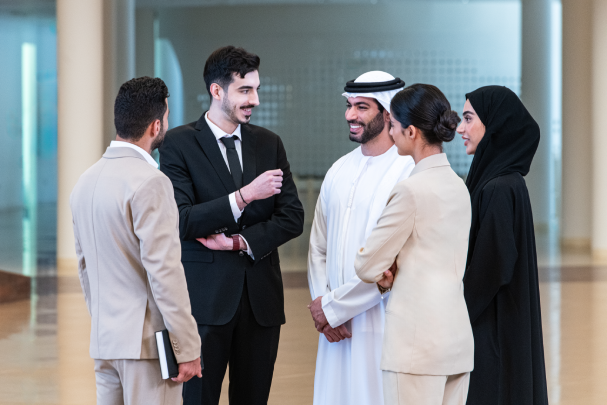Exploring Career Avenues with Zayed University’s Master in Diplomacy and International Affairs
12 Aug, 2024
The job demand for graduates in diplomacy and international affairs in the United Arab Emirates (UAE) is strong, driven by the country’s active engagement in global diplomacy and international relations. The UAE’s strategic geopolitical position and its efforts to foster strong international partnerships have increased the need for professionals equipped with advanced knowledge of international relations, global politics, and diplomatic practices. The demand is also driven by the UAE’s strategic emphasis on fostering international engagement, economic diversification, and regional stability.

Zayed University's Master in Diplomacy and International Affairs
The Value of an Interdisciplinary Approach
Zayed University's Master in Diplomacy and International Affairs program emphasizes a deep understanding of global political dynamics and international law principles, preparing graduate students with the ability to effectively analyze and interpret global issues.
Although this program aligns with the UAE’s strategic vision, and diplomatic and other international initiatives, the program offers an interdisciplinary curriculum that includes courses on diplomatic history, international political economy, public diplomacy, international relations, political and constitutional structure of the UAE, politics of oil, security studies, and area studies. The program also emphasizes practical skills through projects and simulations, fostering a deeper understanding of diplomatic strategies and international policymaking. Furthermore, graduate students have opportunities to interact with international organizations and embassies, gaining firsthand experience and insights into the workings of global diplomacy. This offers opportunities to connect with professionals in the field, providing valuable networking opportunities that can lead to career advancements and collaborations.
This interdisciplinary approach integrates knowledge from various disciplines, equipping graduate students with the analytical and practical skills necessary to navigate complex international issues. This approach also allows them to understand and tackle issues from multiple perspectives and prepare them for a variety of career paths beyond traditional diplomatic roles.
In the UAE, an interdisciplinary study approach is particularly beneficial. The nation’s strategic focus on becoming a hub for innovation, business, and cultural exchange requires professionals who are not only experts in their field but also possess the flexibility to work across different sectors. This cross-disciplinary education is crucial for developing a workforce capable of driving the UAE’s ambitious Vision 2021 and Vision 2030 agendas, which aim to diversify the economy and enhance global competitiveness.
An interdisciplinary curriculum also promotes cultural awareness and social responsibility, aligning with the UAE’s emphasis on tolerance and international collaboration. By exposing graduate students to different viewpoints and global issues, the master’s degree program fosters a deeper understanding of cultural nuances and global independencies. This cultural competence is invaluable in a multinational society like the UAE, where effective communication and collaboration across cultural lines are vital for both societal harmony and international business.
Public Sector
-
- Government and Public Service: Graduates can pursue roles in government and public service (Foreign Service, Ministry of Interior, and Ministry of Defence), such as diplomats, foreign service officers, and policy analysts or advisors, where they contribute to shaping an implementing national foreign policy.
- International Organizations: Graduates may also work for international organizations like the United Nations, the World Bank, or the International Monetary Fund, engaging in global governance, economic development, and humanitarian efforts.
- Government and Public Service: Graduates can pursue roles in government and public service (Foreign Service, Ministry of Interior, and Ministry of Defence), such as diplomats, foreign service officers, and policy analysts or advisors, where they contribute to shaping an implementing national foreign policy.
Private Sector
-
- Non-Governmental Organizations (NGO) and Think Tanks: Graduates can focus on research, advocacy, and program management in areas like human rights, environment sustainability, and conflict resolution.
- Multinational Corporations: Graduates can become consultants for multinational corporations, advising on international trade, compliance, and cross-cultural negotiations. They may also work in corporate diplomacy, helping companies navigate global markets and manage international relations.
- News Media: Graduates can pursue careers as foreign correspondents, international news analysts, or editors specializing in global affairs. Additionally, graduates can work as media advisors or communication specialists within international organizations, governments agencies or NGOs. Another potential career path is media production, where graduates can develop documentaries or special news features focusing on international affairs, helping to educate and accurately inform the public about global issues.
- Academia: Academia offer careers for those interested in research, teaching, or providing expert analysis on international affairs.
- Non-Governmental Organizations (NGO) and Think Tanks: Graduates can focus on research, advocacy, and program management in areas like human rights, environment sustainability, and conflict resolution.
The UAE’s dynamic environment and its status as a global business hub create additional opportunities for diplomacy and international affairs graduates in sectors such as corporate diplomacy, international business, and global marketing. This diverse array of opportunities highlights a strong job market for graduate students in this fields, particularly those who will possess the skills to navigate complex international landscapes and contribute to the country’s diplomatic objectives.
Conclusion
Zayed University’s Master in Diplomacy and International Affairs program is an excellent choice for graduate students aspiring to align with the UAE government’s initiatives and meet the growing job demand in the region. The program’s interdisciplinary approach equips students with a broad spectrum of skills and knowledge that prepares graduates for diverse careers not only in traditional diplomatic roles but also in international organizations, NGOs, and the private sector. The UAE’s strategic emphasis on international engagements, economic diversification and global partnerships has created a robust market for professionals with expertise in diplomacy and international affairs. Thus, pursuing this degree at Zayed University enables graduate students to contribute meaningfully to the UAE’s dynamic and evolving global presence, positioning them at the forefront of global diplomatic and international career opportunities.





